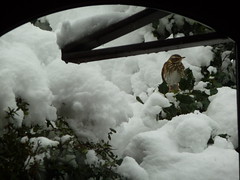Went into town this morning to restock food for our feathered friends, and it started me thinking.
No sign of of the normal winter migrants here. What happens to them if, after arrival, we get four inches of snow? Do they starve or do they in some manner understand that it's warmer further south and up sticks? Anyone know?
Roy.
No sign of of the normal winter migrants here. What happens to them if, after arrival, we get four inches of snow? Do they starve or do they in some manner understand that it's warmer further south and up sticks? Anyone know?
Roy.


































